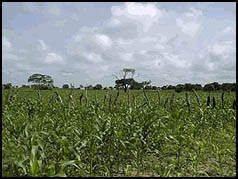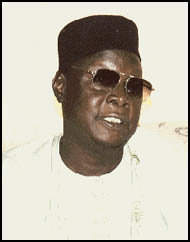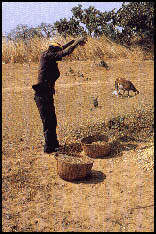 AGRICULTURE, VIRGIN SOILS, READY MARKETS AGRICULTURE, VIRGIN SOILS, READY MARKETS |
Employing 70 percent of the total labour force in The Gambia, agriculture remains one of the most important sectors of the economy. Though yet undiversified, it contributes about 25% of the country's GDP. With only 20 years away from an envisaged middle-income economy with an export oriented agricultural sector, the government has embarked on a diversification strategy that will allow the sector to contribute its true due to national development. The initiative, as with other sectors, is expected to be private sector-led, with support and encouragement form the public authorities in the form of attractive policies and incentives that render the environment increasingly enabling.

To prove its conviction in the abounding potentials of the agricultural sector, the government put it first on the list of priority sectors that could attract sizable and special incentives. Investors interested in the sector would enjoy exemption form customs duties on various items, exemption for sales tax, turnover tax as well as preferential treatment in the allocation of land for the site of proposed activity.
The government is also working to establish the advantages and opportunities available in the various sub-sectors of the industry; this will be with a view to attracting private sector participation in the fields. So far, the horticulture sub-sector has been a success, entirely under the private sector, it has seen production increased steadily and export figures in the field have more than doubled in the last two decades. Despite a local market for the produce in the hotel industry. In 1980 to 1997, exports of horticultural produce have increased form 112.5 MT to 293 MT. Yet, the potentials are not fully exploited. The Gambia's proximity to European market, its horticulture-favourable climate and abundance of labour makes the industry a very promising choice.

There are also spirited efforts to improve on the technology available to the sector. "A research program is on, focusing on new varieties of crops, fertilizing, spacing and other agronomic practices that will help us ensure that we can increase the yield in a given area of land", notes Hassan Sallah, Secretary of State for Agriculture. He also revealed that arrangements are in top gear to set up a research laboratory in The Gambia to ensure the quality of agricultural produce and keep up with advancements elsewhere. It is expected that the results and breakthroughs in research would be handed over to the private sector to make maximum use of. Other produce such as cotton, sesame, cashew and cereals are already part of the government's diversification effort. There has been tremendous breakthrough in rice production, about 20,000 tonnes of rice was produced last year, according to Mr Sallah, and the figure will jump to 35,000 tonnes this year. The objective of the government, through the Agriculture department is to achieve food self-sufficiency in The Gambia and become an exporter of food.
| While encouraging production, there is a mounting emphasis on broadening the range of value-added agricultural produce and products. The challenge will be to encourage processing and industries with the technical know how and expertise. The free export processing zones would be expected to drive the effort while the special incentives should be an added encouragement. There are also a host of international funded projects aimed at improving or rehabilitating the soil condition and the agronomic practices in use. Major among these is The Lowland Development Project (LADEP), which is funded by the International Fund for Agricultural Development (IFAD).

Already, a number of investors have realized the opportunities in Gambia's agriculture. Radville Farms, a collaboration between Indian and British investors is doing well, "they are growing sweet corn as well as a lot of chillies for export into the UK", said Mr Sallah. A number of investors have also registered interest in maize production while there is a 700-hectares request by a Taiwanese investor interested in horticulture. "We have some of the best soils in terms of agricultural production and there are evidence of virgin land in some parts of the country that have the potential of yielding more than 10 tonnes per hectares of rice" remarked Sallah.
However, the problems of proper marketing of the Gambia produce remains one of the most acute challenges that the government is faced with. Last year, marketing the peanuts was a little difficult after Alimentia Corporation, marketers of the produce pulled out of the country. Out of about 127,000 metric tons produced, only 43,000 were marketed. With expectations of increasing production, the challenge remains poignant. The horticulture sub-sector also holds a lot of promise, but these won't be fulfilled in the absence of an efficient marketing procedure.
But there are hopes of a bridge to this gap. The impasse between the government and Alimentia has been amicably resolved, and two new marketing companies are set for the next season. Hilo Trading Ltd holds the hope of buying 40,000 metric tons while Premier Agro Oils will require 35,000 metric tons for processing into exportable vegetable oil. While this may be good news, the need for proper marketing remains to be addressed. At the recent First Gambia Economic Summit, public and private sector participants agreed that there is an urgent need for a proper marketing of the country's horticulture and other produce.
With its proximity to foreign and regional markets, the availability of reasonably cheap labour and unending hectarage of virgin soils, The Gambia believes there will be investors wanting to take advantage of this opportunity. |

